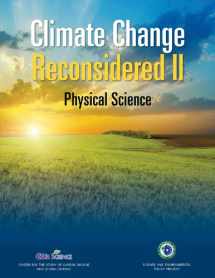
Climate Change Reconsidered II: Physical Science
Book details
Summary
Description
This report is produced by the Nongovernmental International Panel on Climate Change (NIPCC), a joint project of the Center for the Study of Carbon Dioxide and Global Change, Science & Environmental Policy Project, and The Heartland Institute. Three lead authors--Craig D. Idso, Robert M. Carter, and S. Fred Singer--assembled and worked closely with nearly 50 chapter lead authors, contributors, and reviewers from 15 countries. This volume was subjected to the common standards of peer-review.
This work provides the scientific balance missing from the overly alarmist reports of the United Nations Intergovernmental Panel on Climate Change (IPCC), which are highly selective in their review of climate science and controversial with regard to their projections of future climate change.
Although the IPCC claims to be unbiased and to have based its assessment on the best available science, we have found this to not be the case. In many instances conclusions have been seriously exaggerated, relevant facts have been distorted, and key scientific studies have been ignored. NIPCC authors paid special attention to contributions that were either overlooked by the IPCC or that contain data, discussion, or implications arguing against the IPCC s claim that dangerous global warming is resulting, or will result, from human-related greenhouse gas emissions.
Most notably, the authors of CCR-II say the IPCC has exaggerated the amount of warming they predict to occur in response to future increases in atmospheric CO2. Any warming that may occur is likely to be modest and cause no net harm to the global environment or to human well-being. A careful reading of CCR-II reveals thousands of peer-reviewed scientific journal articles that do not support, and indeed often contradict, the IPCC s alarmist perspective on climate change. This is not an exercise in cherry picking: There are simply too many articles by too many prominent scientists, reporting too much real-world data and not merely opinions. Either the IPCC purposely ignores these articles because they run counter to their predetermined thesis that man is causing a climatic crisis, or the IPCC s authors are incompetent and failed to conduct a proper scientific investigation. Either way, the IPCC is misleading the scientific community, policymakers, and the general public by telling only half the story about the science of climate change.
If the IPCC truly considered and acknowledged all pertinent science in its assessment reports, there would be no need for a NIPCC. Until such time as the IPCC changes its ways (or is dissolved), NIPCC will continue to inject balance into the scientific debate by finding and reporting the scientific research that the IPCC overlooks. Much of it deals with natural climate processes or variability, weaknesses in climate models and data sets used to measure temperatures or forecast future climate conditions, or with data that raise serious scientific questions about the IPCC s attribution of climate change to human greenhouse gas emissions.
Our sole goal in presenting this information is to enable fellow scientists, elected officials, educators, and the general public to make up their own minds about what the science says, to understand climate change rather than simply believe in it. Each of the seven chapters in this volume begins with a list of key findings that contradict those of the IPCC. These findings are then discussed in detail using in-depth reviews and analyses of literally thousands of scientific papers. Full citations to the work reviewed are presented at the end of each section.


We would LOVE it if you could help us and other readers by reviewing the book
Book review



